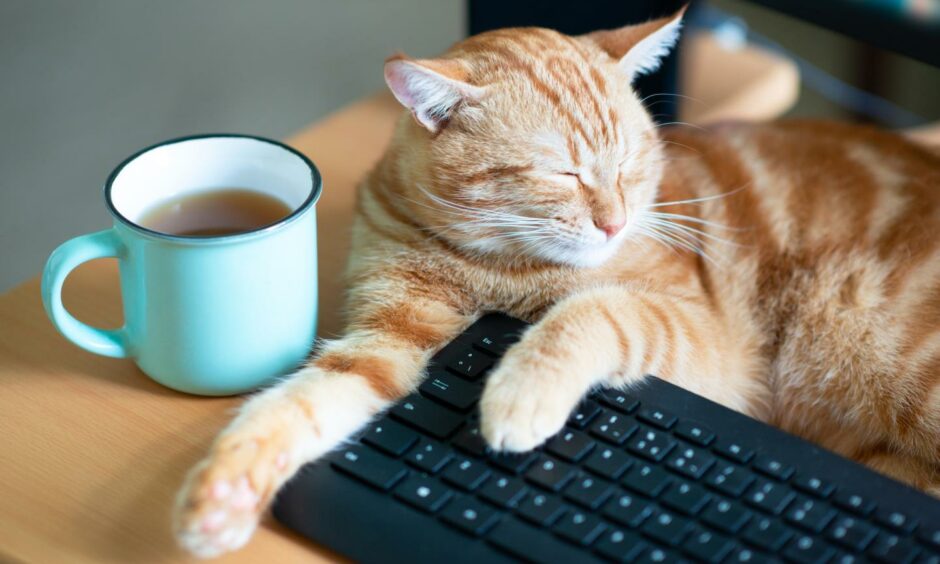Long gone is the time when white-collar workers in Aberdeen, Inverness and elsewhere around the UK had no choice but to spend every day in the office.
The arrival of Covid on our shores, combined with massive advances in technology, led to a widespread move to regular working from home.
The introduction of 4G and cutting-edge mobile devices has made staying connected with colleagues very easy no matter where you are. An “office” can be someone’s living room, a cafe or even the top of a mountain.
Bone of contention
Staff not being in their proper office on a regular basis is a contentious topic – many employees love it, while their bosses often hate it.
Only time will tell if working from home will become even more established in the years ahead, or if it will eventually begin to retreat in an ever-changing business environment.
One major downside of remote working is the damage to the country’s city centres and the service-sector businesses based there since workers vanished during the pandemic.
Retailers, bars, restaurants, sandwich shops and coffee outlets are among those who suffered badly as their daily trade from workers located around them dried up.
And the bad news is that many of these regulars are still missing.
Aberdeen’s Union Street, which was already in a long-running state of decline, felt the full force of this dramatic downturn in footfall. It was the last thing the Granite Mile needed.
In an effort to turn the street’s fortunes around, an emergency summit was held in November.
More than 170 business leaders and politicians attended the event, called by Aberdeen Inspired and Aberdeen and Grampian Chamber of Commerce, to address the need for immediate action.
Retailers, bars, restaurants, sandwich shops and coffee outlets are among those who suffered badly as their daily trade from workers located around them dried up. Many of these regulars are still missing.”
Among suggestions tabled was that an expert coalition should be formed to lure new local and national businesses to a regenerated and revitalised Union Street.
Meanwhile, pressure has also been growing on Aberdeen City Council (ACC) to encourage more of its staff to return to its huge office site in the city centre – and boost trade for local service-sector firms.
Half empty council HQ
It recently emerged the council’s Marischal College headquarters have been only about half full.
There is space for 1,150 workers, but hundreds of desks have been sitting empty every day.
A council spokeswoman stressed that, as a flexible employer, the local authority offered a “range of working styles, which includes part-time and hybrid working”.
ACC employs 8,000 staff across sites like depots, primary schools, community centres and libraries.
Eric Shearer, partner and office head with property firm Knight Frank in Aberdeen, is unhappy about the council’s stance on remote working – and feels the local authority needs to show leadership on getting more employees back into the office regularly.
He said: “It is disappointing to see a lack of encouragement from both the UK and Scottish governments, and local authorities for their staff to return to work.
Aberdeen City Council, as a public-facing operation, really needs to display leadership on something like this.”
Erick Shearer, partner, Knight Frank.
“I am sure there is a compromise possible – where staff still get some form of say on when they can work from home, but the majority of the time they are back at the office.
“Aberdeen City Council, as a public-facing operation, really needs to display leadership on something like this so that we can bring life back into the city centre.
‘Every penny counts’
“This would help retailers and hospitality businesses. Every penny counts for them at this difficult time.
“If I were a council leader, I would want staff in the office – unless there is very good reason why they shouldn’t be.”
Mr Shearer said remote-working practices were having a significant effect on companies’ choice of new offices.
He added: “Most of the large requirements recently satisfied have involved companies reducing their space needs by between 25%-50%. The Shell and BP relocations in Aberdeen being the best examples.
“New office requirements are fully reflecting the more hybrid working models, with greater emphasis on a range of working spaces for collaboration, quiet areas and break-out areas.”
Elon Musk fires warning shot across the bows in remote working debate
Globally, some bosses have been outspoken about their opposition to working from home.
The most vocal is probably US billionaire Elon Musk, who told Twitter staff remote working will end.
In an e-mail to workers, the new owner of the social-media firm said workers would be expected in the office for at least 40 hours a week.
The San Francisco-based company told staff in May 2020 they could work from home “forever” if they wished to, because the company believed its remote-working measures during Covid lockdowns were a success.
But Mr Musk has a dim view of remote work, saying “all the Covid stay-at-home stuff has tricked people into thinking that you don’t actually need to work hard”.
There is a “rude awakening inbound,” he added.
Mr Shearer is a chartered surveyor who has been involved in the buying, selling and leasing of commercial real estate for the past 40 years.
He said: “I have seen a number of trends and economic factors that have altered how the occupation of office buildings has evolved over that period.
“Before Covid, the main influence on people occupying office space was our economy, which has for the last 50 years revolved around the health of the oil and gas industry.
“The higher the oil price, the higher the demand for and take-up of office space.”
84% of office workers want hybrid system
But the Knight Frank office head said Covid had changed forever how people view the office.
He explained: “Research suggests 84% of office workers want a hybrid system, while only 11% say they want to return to the office full-time.”
Ryan Crighton, policy and marketing director at the chamber of commerce, said no one was seriously suggesting remote working will mean the death of the office.
But he added: “If less days working in the office becomes the norm, the impact on footfall, the viability of businesses serving office workers, the office property market and the public transport system could be profound, especially if it is accompanied by long-term changes in shopping, entertainment and leisure.
“The common thread here is necessity. The things which once necessitated a visit to the city centre – be that access to goods or the office – are changing through technology.”
Mr Crighton added: “Visits to the city centre will be increasingly down to choice. They must, therefore, offer experiences and facilities that people cannot access in their local neighbourhoods.
“The 2020 pandemic low point in the office market is now past and the shift to smaller, better offices and release of older, obsolete buildings is already under way.
“Surveys suggest occupiers will need less but better office space.
“This is backed up by the trends we are seeing in Aberdeen, as well as Edinburgh and Glasgow, which are already achieving record office rents for the newest buildings, reflecting their top prime locations, top-quality specification and costs.”
Pros and cons of remote working
Weighing up the possible benefits and potential downsides of working from home will help you decide if it is best for you.
Job site Indeed has come up with some points to bear in mind. These include:
First the pros
- Less commuting, less stress and fewer expenses. Working from home decreases your travel, which can also reduce stress. It saves you the cost of transportation, other travelling expenses and may also cut down the amount you’d spend on work clothes, etc.
- A better work-life balance. Many professionals find it hard to find stability between their work and personal lives. Working from home can help with this. It allows you to build your work schedule around your personal life.
- You may have little to no distractions while working from home, compared with a busy office.
- Working independently in a distraction-free environment can increase your productivity.
- More independence – working in an office may require you to follow specific routines every day, not allowing you to make changes on days you really feel like you need to. Working from home can be a major turnaround from this.
- Improved skills – working remotely may require you to use telecommuting tools, such as Skype, which require technical skills to operate.
- Remote working allows for a lot of flexibility. It also allows you to work to your own productive hours, in your preferred attire and build a workflow that is best for you.
- Reduced work absenteeism – fatigue, sickness or having to attend to more pressing issues are the principal causes of absence from work. Since working from home offers flexibility, and meetings are not physical, it allows you to attend to matters without having to be marked absent.
- Being allowed to work remotely may give staff a feeling of satisfaction because of the flexibility and independent decision-making that comes with it.
- Working from home can create job opportunities for people with difficulties performing a traditional role in a typical office setting.
Now the cons
- Less workplace connection and isolation – remote working results in less face time between you and your co-workers. It can lead to reduced communication and not having immediate access to information. It also causes boredom, as you are alone most of the time.
- Working from home may put you at risk of overworking. When you work from home and don’t lay out your schedules properly, there can be fewer distinctions between work and personal life.
- The cost of equipment – working from home can require using stuff like webcams, software, headsets and other tools to stay connected to others from your workplace, as well as carry out important projects. You may also need a chair, desk and other furniture.
- Televisions, pets, noise from traffic, household chores and children can be a source of distraction at home.
- While remote working can increase your productivity, it may also challenge it. Taking breaks and naps whenever you feel like it while working independently may affect your focus on tasks. Remote working requires proper planning and a lot of discipline.
- Another downside to remote working is full-time dependence on technology. Without an internet connection, your working day may be very problematic.












Conversation